We decided this year that it was time to replace our venerable old Volvo
with a vehicle that could be used to demonstrate our OBD
scan tool systems. Having bought a house on a hill in the countryside, we felt that it
would make sense to purchase a compact SUV with 4 wheel drive to handle the occasional bout
of snow and ice conditions in the winter.  Other issues that affected our decision included
fuel economy, safety and ride comfort. Jenni and I had originally considered buying
the superb Subaru Outback wagon, but found that we preferred the extra
space and raised seating position (visibility) of the compact SUV class.
If I was doing it again today, I would get
a FREE QUOTE first from the folks at Automotive.com.
Other issues that affected our decision included
fuel economy, safety and ride comfort. Jenni and I had originally considered buying
the superb Subaru Outback wagon, but found that we preferred the extra
space and raised seating position (visibility) of the compact SUV class.
If I was doing it again today, I would get
a FREE QUOTE first from the folks at Automotive.com.

We tested most of the compact SUV's and found that our choice would not be
an easy one. We ruled out the heavy duty, off-road type as we did not want
to use it for that purpose, choosing quietness, ride comfort and economy
over mud bashing and all out ditch crawling capabilities. We found that
the remaining choices were too large, or too noisy, or underpowered or
uneconomical. Road and engine noise were big issues for us, particularly
since my Solara had set a new
benchmark in this area.
Looking for a great deal on a vehicle?
Check out the government surplus / repo site:

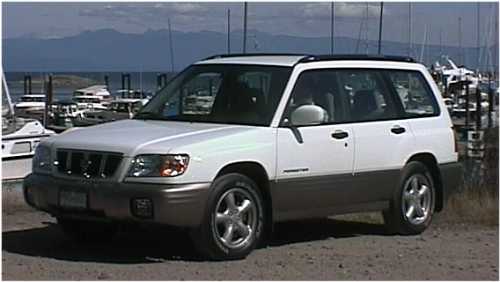
The deluxe 'S' model features 16" wheels, 4 wheel disc brakes,
limited slip differential.
Finally, we drove the Forester and found that it had the combination of
qualities we had been looking for. We immediately discovered that it had very
low road noise at all speeds, a peppy 2.5 L four cylinder engine with
reasonable gas consumption, plenty of interior space with high visibility,
excellent ride comfort and a high level of 'fit and finish'. 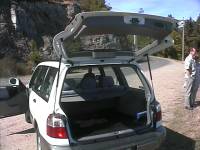 Heated
seats, mirrors and windshield wipers add a nice touch to the level of
comfort. The absence of a rear tire mount allows the cargo door to swing
up high, out of the way, creating an effective rain shield. The rear seats
flip down, creating a large storage area that easily handles larger
objects such as furniture, bicycles, etc.
Heated
seats, mirrors and windshield wipers add a nice touch to the level of
comfort. The absence of a rear tire mount allows the cargo door to swing
up high, out of the way, creating an effective rain shield. The rear seats
flip down, creating a large storage area that easily handles larger
objects such as furniture, bicycles, etc.
The 152 cubic inch (2.5 Litre) SOHC 'boxer' engine (also used in Outback models) has a sophisticated fuel injected
4 valve per cylinder design that puts out 165 peppy horses (yes, that's better than a 1 hp/cubic inch ratio). It also
generates 166 lb-ft of torque that provides plenty of kick at
low rpm, without straining the engine. The horizontally opposed
design whereby the pistons are arranged 'lying down' keeps the center of
gravity very low in this vehicle (it has no tendency to roll that I could
detect), with the added safety bonus that it slides under the cab in the
event of a head on collision. The 7 year bumper to bumper extended
warranty also contributed to our peace of mind around this purchase;
there's a lot of value here for around $25k US ...
The powertrain is very quiet and the motor exhibits none of the high
pitched whine of smaller engines when
accelerating rapidly. It is smooth and quiet at idle and hard to
tell if it is actually running if there is any ambient noise. I
have actually had to glance at the tachometer a few times to assure myself
that it was indeed turning over.
Fuel consumption is surprisingly low considering the AWD and abundant
power of the engine,
probably due in part to the 'true overdrive' feature of the silky smooth
electronically controlled 4 speed automatic transmission. There are no
levers for the AWD, just a conventional console shift that can be
basically left in 'Drive' all the time you are moving. At highway
speeds I found I was getting close to 28 mpg (70 mph @ 2700 rpm) with
regular gas. The electronic cruise control is perfectly smooth and adjusts
the electronically controlled automatic overdrive (ECT) transmission and
throttle position to regulate downhill and uphill speeds. All cruise functions are
controlled by the wheel mounted switch, so 'drive by finger' is entirely
possible in this car. Tapping the set switch up or down adjusts the cruise
setting in 2 mph increments - handy for fine speed adjustment while in
traffic.
The interior is roomy and comfortable, with plenty of legroom for driver
and passenger. With some minor positioning of the front seats, the rear
seating is also comfortable for additional passengers. All controls are
well placed and easily understood, and there are storage compartments
everywhere you look, not to mention Subaru's famous pop-out dash holder
for drinks. We found the seats very comfortable, even on extended drives,
with no feelings of fatigue from a long drive.
Despite the elevated profile, this SUV also handles very well. 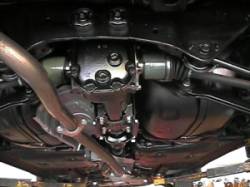 It has MacPherson strut front suspension with gas-filled shock absorbers
and dual-link independent rear strut suspension. The
S model also comes with a limited-slip rear differential for added
traction control. Note how compact the differential housing is (picture),
providing excellent ground clearance..
We have yet to try it on snow and ice, but turning out quickly from a
gravel road onto asphalt with a lot of power applied produced no slippage
whatsoever.
It has MacPherson strut front suspension with gas-filled shock absorbers
and dual-link independent rear strut suspension. The
S model also comes with a limited-slip rear differential for added
traction control. Note how compact the differential housing is (picture),
providing excellent ground clearance..
We have yet to try it on snow and ice, but turning out quickly from a
gravel road onto asphalt with a lot of power applied produced no slippage
whatsoever.
The steering is effortless with the speed sensing, variable-assist power rack-and-pinion mechanism.
Our Volvo was the all-time 'instant U-turn' turning ratio champ, but we
were very impressed with the tight turning ratio on the Forester,
especially considering that it is a 4WD vehicle. Braking is superb, with 4
wheel disk brakes on the 16" Yokahama performance radials and an ABS (Antilock
Braking System) coupled to a 4 channel 4 sensor actuation
system.
With all the electronic sophistication of the Forester, the OBD (On
Board Diagnostic) 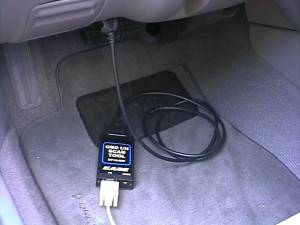 system hasn't been neglected either.
The DLC
(Data Link Connector) port is tucked neatly under the driver's side dash, facing down
and flush with the lower edge. Although you can't see it without peering
under the dash, the positioning is such that plugging a scan tool in is a
relatively simple task.
system hasn't been neglected either.
The DLC
(Data Link Connector) port is tucked neatly under the driver's side dash, facing down
and flush with the lower edge. Although you can't see it without peering
under the dash, the positioning is such that plugging a scan tool in is a
relatively simple task.
The data stream coming into the software scan tool revealed the structure
of the emission control system, with oxygen sensors at the
heart of the emissions control system. The scan
tool digital readout could easily detect the 7 rpm
idle speed variation, although it was impossible to see this on the
vehicle's tachometer (this is one smooth engine!). We were also able to
observe increased system activity when the engine cooling fan kicked in,
holding the engine temperature very close to 199° F. There are many other parameters that can be
monitored.
As expected, there weren't any trouble codes stored in the on board
memory, 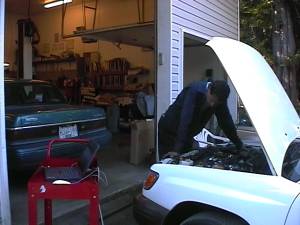 but we'll report later in an updated article if this happens.
We arranged for a full service manual to be delivered with this car and will be thoroughly examining the control systems over the next
few months. If
you're interested in some of the screen data, please see the screen
captures below. If you're interested in getting this software for your own
car, take a look at our scan tool products
page.
but we'll report later in an updated article if this happens.
We arranged for a full service manual to be delivered with this car and will be thoroughly examining the control systems over the next
few months. If
you're interested in some of the screen data, please see the screen
captures below. If you're interested in getting this software for your own
car, take a look at our scan tool products
page.
* * * * *
Kudos to Subaru - the Forester met all our expectations of what a new
compact SUV should be like ... smooth, comfortable and efficient,
with great traction control and cargo space rolled into one affordable
package.



 Other issues that affected our decision included
fuel economy, safety and ride comfort. Jenni and I had originally considered buying
the superb Subaru Outback wagon, but found that we preferred the extra
space and raised seating position (visibility) of the compact SUV class.
If I was doing it again today, I would get
Other issues that affected our decision included
fuel economy, safety and ride comfort. Jenni and I had originally considered buying
the superb Subaru Outback wagon, but found that we preferred the extra
space and raised seating position (visibility) of the compact SUV class.
If I was doing it again today, I would get


 Heated
seats, mirrors and windshield wipers add a nice touch to the level of
comfort. The absence of a rear tire mount allows the cargo door to swing
up high, out of the way, creating an effective rain shield. The rear seats
flip down, creating a large storage area that easily handles larger
objects such as furniture, bicycles, etc.
Heated
seats, mirrors and windshield wipers add a nice touch to the level of
comfort. The absence of a rear tire mount allows the cargo door to swing
up high, out of the way, creating an effective rain shield. The rear seats
flip down, creating a large storage area that easily handles larger
objects such as furniture, bicycles, etc.  It has MacPherson strut front suspension with gas-filled shock absorbers
and dual-link independent rear strut suspension. The
S model also comes with a limited-slip rear differential for added
traction control. Note how compact the differential housing is (picture),
providing excellent ground clearance..
We have yet to try it on snow and ice, but turning out quickly from a
gravel road onto asphalt with a lot of power applied produced no slippage
whatsoever.
It has MacPherson strut front suspension with gas-filled shock absorbers
and dual-link independent rear strut suspension. The
S model also comes with a limited-slip rear differential for added
traction control. Note how compact the differential housing is (picture),
providing excellent ground clearance..
We have yet to try it on snow and ice, but turning out quickly from a
gravel road onto asphalt with a lot of power applied produced no slippage
whatsoever. system hasn't been neglected either.
The DLC
(Data Link Connector) port is tucked neatly under the driver's side dash, facing down
and flush with the lower edge. Although you can't see it without peering
under the dash, the positioning is such that plugging a scan tool in is a
relatively simple task.
system hasn't been neglected either.
The DLC
(Data Link Connector) port is tucked neatly under the driver's side dash, facing down
and flush with the lower edge. Although you can't see it without peering
under the dash, the positioning is such that plugging a scan tool in is a
relatively simple task. but we'll report later in an updated article if this happens.
We arranged for a full service manual to be delivered with this car and will be thoroughly examining the control systems over the next
few months. If
you're interested in some of the screen data, please see the screen
captures below. If you're interested in getting this software for your own
car, take a look at our scan tool
but we'll report later in an updated article if this happens.
We arranged for a full service manual to be delivered with this car and will be thoroughly examining the control systems over the next
few months. If
you're interested in some of the screen data, please see the screen
captures below. If you're interested in getting this software for your own
car, take a look at our scan tool 